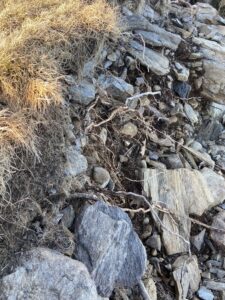Newswise — The sun shines on the cold, deep blue ocean at Fort Williams Park in Cape Elizabeth, Maine. Portland Head Light, an iconic landmark that draws in three million visitors each year, stands proudly at the edge of the rocky shore. The view of Maine’s southern coast from here is perfect. However, there is a big problem shrouded within this picturesque landscape.
Peering over the edge of a nearby bluff, you can see that the water is slowly eroding it. Live roots can be seen in the dirt along the face of the bluff, appearing ripped apart by the ocean. Erosion like this happens when the water levels reach record highs relentlessly pounding the coast, which has already happened several times this year in Maine.
According to National Geographic, rising sea levels increase the intensity of storm surges and flooding in coastal areas, leading to increased storm damage. Storms are wreaking havoc on Maine’s iconic coastline and it’s getting worse with every storm.
During a severe storm in January, South Portland said goodbye to its historic fishing shacks that have stood at Willard Beach since the 1800s. The shacks were washed away during the storm when water levels hit over 14 feet, according to USA Today and the National Weather Service. Treasured and adored by the community, the fishing shacks represented a proud heritage of life by the sea. They were often used as backdrops for important moments such as graduation photos and marriage proposals. And now, these pieces of history are gone. The story was even picked up by the New York Times.
Along with the rising sea levels and intense storm surges, the water is also getting warmer. Devan Newell, 21, has been witnessing the harsh effects of warming waters in Maine for many years. When Devan was ten, he started to notice an alarming number of seals washing up on the beach in his neighborhood. The warming of the Gulf of Maine has caused acidity levels to rise in the ocean, making seals more prone to fatal infections.
According to the Gulf of Maine Research Institute, the Gulf of Maine is warming faster than practically any other ocean surface on the planet due to the strengthening of the Gulf Stream which is bringing in warmer water. U.S. News claims that 70 percent of American marine mammal species are vulnerable to threats like loss of food and habitat due to warming waters.
Seeing dead seals on the beach upset young Devan and inspired him to take action to help the seals. To raise money, Devan and his neighbor started painting rocks they found on the beach and sold them around town. They raised thousands of dollars for Marine Mammals of Maine, a nonprofit organization dedicated to the health and safety of all marine mammals and sea turtles in southern and midcoastal Maine. “It felt really good to raise that money. Even though it was a long time ago, I know that my donation made a positive impact,” says Devan.
According to the Ocean Conservatory, the ocean has absorbed over 90 percent of heat from human-caused industrial waste, especially carbon emissions. While the ocean has protected us from the worst effects of climate change since the beginning of industrialization, we can no longer deny the harmful effects the ocean has endured due to the accumulated effects of all this
pollution.
Brian Guthrie, 61, a long-time resident of southern Maine, has noticed a big change in how warm the water is getting. “It smells sweeter, too, because the water is becoming more tropical with global warming.”
With all the information in the news and the visible changes in our environment, it can be hard to keep an optimistic outlook on the future of our planet. Especially with access to social media, everyone has a magnifying glass on current world issues. You could be halfway across the globe and still stay up to date on current events, including the impacts of climate change in certain areas. Even though the media bombards us with negative information about climate change, it is important to stay optimistic and get involved. There is so much you can do to help make meaningful change, “one drop of water” at a time. As Devan did, get creative and get involved!
Getting involved will help inspire optimism. Here are a few examples of how you can be one
drop of water:
- Volunteer with organizations such these:
–Biodiversity Research Institute
–Gulf of Maine Research Institute
–Marine Mammals of Maine
–ClimateWork Maine - Donate to any one of hundreds of nonprofits promoting public awareness of these issues
- Vote for environmentally responsible local politicians.
- Watch An Optimists Guide to the Planet, a new six-episode television series that focuses
on solutions to some of the biggest environmental challenges of our time.
More stories on https://briwildlife.org/bri-blog/.


